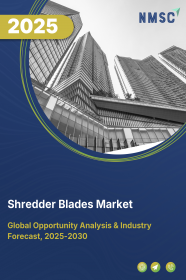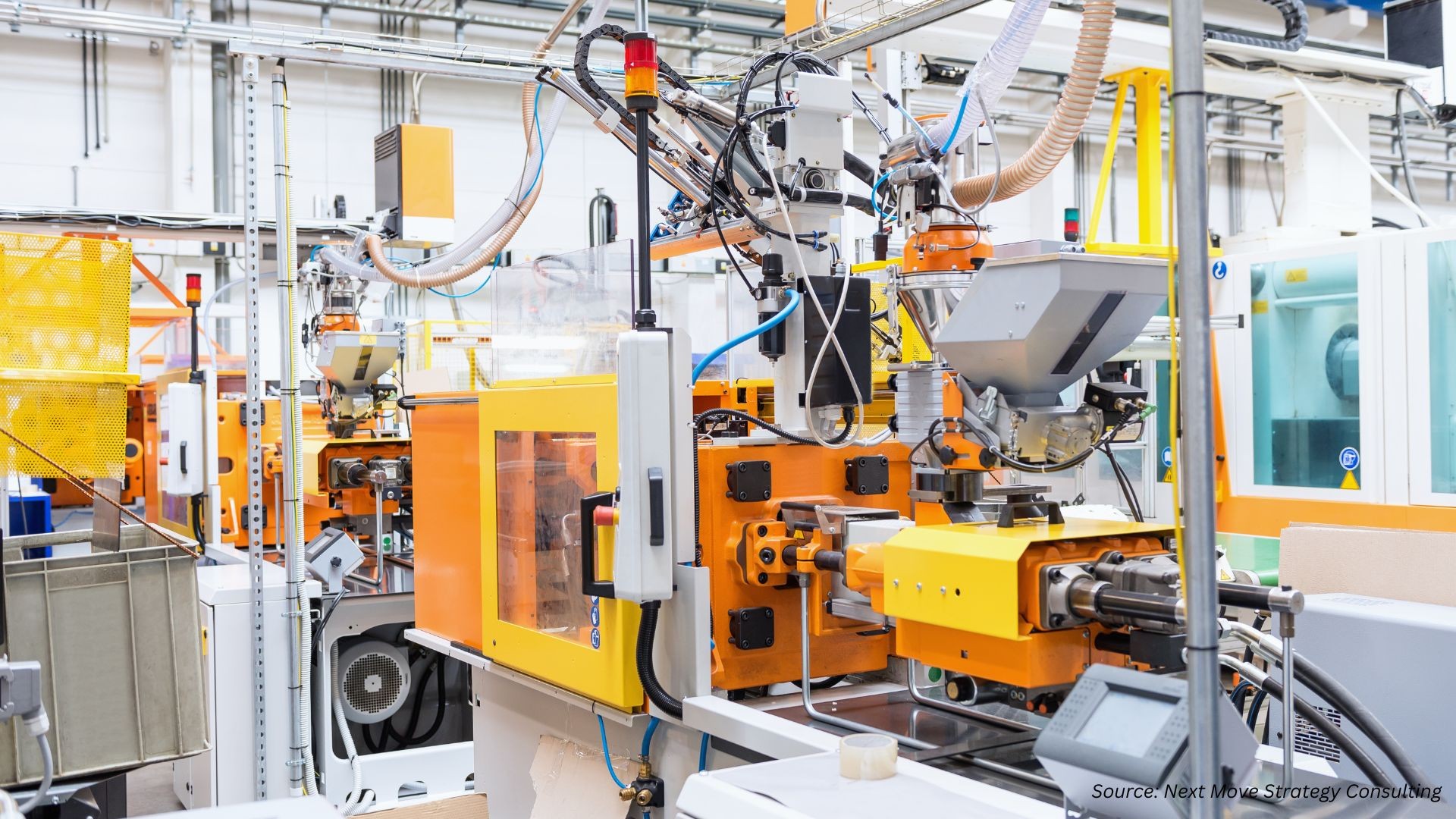
Shredder Blades Market by Blade Material (Carburizing Steel, Tool Steel, Case Hardened, and Others), by Shaft Count (Single Shaft, Double Shaft, and Others), by Blade Design (Hook and Square), by Application (Plastic, Rubber, Metal, Wood, E-Waste, and Paper & Cardboard and Others), and by End-User (Waste Management & Recycling, Food, and Others) – Global Opportunity Analysis and Industry Forecast, 2025–2030
Shredder Blades Industry Overview
The global Shredder Blades Market size was valued at USD 449.2 million in 2024 and is predicted to reach USD 473.2 million by the end of 2025. The industry is predicted to reach USD 614.5 million by 2030 with a CAGR of 5.4% from 2025 to 2030.
The market is experiencing significant growth driven by the global rise in industrial and municipal waste generation. As industries seek to enhance sustainability and reduce landfill usage, the demand for high-performance shredding solutions is rising. Regulatory frameworks focused on recycling efficiency are pushing companies to invest in reliable and compliant shredding systems. In parallel, capital investments in modern waste management infrastructure are fueling the need for durable blades capable of processing varied and complex materials.
However, high maintenance and replacement costs remain a key restraint, particularly for small and medium enterprises. Despite this, innovations in sustainable blade materials and eco-efficient designs are opening new opportunities, aligning the market with circular economy goals and environmentally responsible operations.
Surge in Waste Generation Drives the Market Growth
One of the key growth drivers in the shredder blades market growth is the sharp increase in global waste production, especially industrial and municipal solid waste. This trend is compelling industries to invest in advanced shredding solutions to meet sustainability goals and reduce landfill dependency. The rise in e-waste and plastic consumption has further necessitated high-performance shredder blades capable of handling diverse materials. According to the World Bank, global waste is expected to grow by 70% by 2050, highlighting the growing market size for shredding technologies that offer efficient waste volume reduction.
Regulatory Push for Recycling Efficiency Boosts the Market Growth
Strict government policies and environmental regulations aimed at reducing carbon footprints have accelerated the need for efficient recycling systems. Shredder blades, as a core component in this chain, are seeing heightened demand. The European Union’s Waste Framework Directive and similar regulations in the U.S. and Asia are pushing industries to adopt shredding equipment that supports resource recovery. These policies not only increase the shredder blades market demand but also encourage companies to innovate for compliance and performance.
Capital Investment in Waste Management Infrastructure Fuels the Market Growth
As public and private investments pour into upgrading waste processing infrastructure, the need for reliable and long-lasting shredder blades is growing. Companies like Eco Green Equipment and Metso have launched new shredder models equipped with wear-resistant blades that enhance throughput and reduce downtime. These investments aim to handle complex materials like tires, metals, and construction debris, expanding the industry size of shredder blade manufacturing globally.
High Maintenance and Replacement Costs Hinders the Market Growth
While large facilities can absorb the cost of frequent blade replacements and maintenance, small and medium enterprises struggle with the high lifecycle cost of shredder blades. Factors like frequent downtime, specialized technician requirements, and material fatigue add to the overall expenditure. This price sensitivity restricts market penetration for smaller vendors and slows adoption in cost-conscious sectors.
Development of Eco-Efficient Blade Materials Creates Opportunity for Market Growth
A significant opportunity in the industry lies in the development of sustainable and eco-efficient blade materials. As industries prioritize environmentally responsible operations, manufacturers are exploring advanced materials such as recycled steel alloys, tungsten carbide composites, and ceramic-infused metals to extend blade life and reduce replacement frequency. This not only cuts down on waste generation from worn-out blades but also supports circular economy principles by reducing the environmental footprint of shredding operations. Companies like Maxtor Metal and Eco Green Equipment are leading this shift, focusing on blades that offer higher wear resistance and energy efficiency, thus contributing to greener waste processing systems.
In December 2024, EDGE Innovate launched the HS750 horizontal shredder, a high-capacity solution engineered to tackle the increasing challenge of decommissioned wind turbine blades. The machine’s durable design allows for the efficient shredding of tough fiberglass blades, transforming them into recyclable materials that can be repurposed in industries such as cement production. The HS750 showcases the potential of advanced shredding technology to drive sustainability, facilitating the recycling of complex materials like wind turbine blades, reducing landfill waste, and promoting the principles of the circular economy.
Market Segmentations and Scope of the Study
The shredder blades market report is segmented on the basis of blade material, blade design, blade shaft count, application, end-users, and region. On the basis of blade material, the market is classified into carburizing steel, tool steel, case hardened, and chromium low alloy steel. On the basis of blade design, the market is divided into hook and square. On the basis of shaft count, the market is classified into single shaft, double shaft, and other shafts. On the basis of application, the market is categorized into plastic, rubber, metals, wood, e-waste, paper & cardboard, and other applications. On the basis of end-users, the market is segmented into waste management & recycling, foods, pharmaceuticals, and others. Regional breakdown and analysis of each of the aforesaid segments include regions comprising North America, Europe, Asia-Pacific, and Rest of the World (RoW).
Geographical Analysis
North America remains a dominant player in the global shredder blades market share, with the region being at the forefront of technological innovation and sustainable practices. The United States and Canada have increasingly focused on improving recycling capabilities, especially with the growing need to process complex materials like electronic waste, metals, and decommissioned wind turbine blades. The rising emphasis on sustainability and the circular economy has driven demand for advanced shredding solutions. Notably, in 2023, EDGE Innovate launched the HS750 horizontal shredder, designed to handle tough fiberglass wind turbine blades, highlighting the region's role in addressing pressing environmental challenges. The North American market is expected to maintain a strong growth trajectory, supported by its robust industrial infrastructure, regulatory support for green initiatives, and increasing investments in eco-friendly technologies.
Europe is poised for steady growth in the shredder blades market share, driven by a commitment to environmental sustainability and advanced recycling technologies. Countries like Germany, France, and the UK are leading the way with cutting-edge developments in waste management and material recycling. The European Union's stringent regulations surrounding waste disposal and recycling, alongside incentives for circular economy practices, are fostering a favorable market environment. In 2023, Metso introduced a new auto shredder system tailored for the European market, aimed at enhancing material recovery and efficiency in scrap metal recycling. Europe’s focus on decentralized recycling operations and environmentally friendly shredding solutions positions the region as a key player, with growing opportunities in both municipal and industrial applications.
Asia-Pacific is experiencing significant growth in the shredder blades sector, driven by rapid industrialization, expanding manufacturing sectors, and increasing waste management needs. Countries like China, India, and Japan are witnessing surges in demand for shredding solutions, particularly in metal recycling and waste-to-energy sectors. The region’s market share is further bolstered by increasing investments in infrastructure and technology to handle complex waste types, including plastics, tires, and electronic waste. In 2024, Wiscon Envirotech launched new industrial shredding equipment specifically designed for high-performance plastic waste recycling, addressing the region's rising environmental concerns. The Asia-Pacific region also benefits from competitive pricing and a growing emphasis on upgrading recycling plants with more efficient, energy-saving shredding technology.
The Rest of the World (RoW) market for shredder blades is evolving rapidly, driven by increasing awareness of waste management practices and a focus on sustainability. In regions such as Latin America, Africa, and the Middle East, the demand for advanced shredding solutions is rising as industries look to improve recycling capabilities and reduce environmental impact. Countries such as Brazil and South Africa are making strides in improving their recycling infrastructures, although they face challenges in terms of capital investment and technological adoption. Despite these challenges, the RoW market presents significant growth potential, especially as global supply chains expand, and waste recycling becomes more critical. The introduction of products like Harden Machinery’s heavy-duty shredder blades in emerging markets in 2023 signifies the growing interest in these regions to adopt efficient and sustainable shredding technologies.
Strategic Developments by Key Players in the Industry
Key players in the global shredder blades industry are increasingly adopting advanced strategies to stay competitive and meet the rising demand for sustainable waste management solutions. Many companies are focusing on innovation, improving the performance, durability, and energy efficiency of their high-strength cutting blades. For instance, EDGE Innovate and Metso have recently launched cutting-edge products such as the HS750 horizontal shredder and enhanced auto shredders to address specific challenges like processing tough materials, including wind turbine blades and electronic waste. These innovations highlight the industry's push towards providing more efficient, environmentally friendly solutions to meet the growing need for recycling and waste management.
However, these companies face challenges related to high operational costs, technological complexity, and the need for continuous investment in R&D to keep pace with emerging recycling trends. Furthermore, supply chain disruptions and the fluctuating cost of raw materials are persistent issues that could affect profitability. Despite these challenges, there are significant opportunities in expanding the adoption of shredding technologies in emerging markets, particularly in Asia-Pacific and Latin America, where recycling infrastructure is rapidly evolving. The increasing regulatory focus on sustainability and circular economy practices provides a favorable environment for growth, allowing industry leaders to capitalize on innovations that align with global environmental goals. As demand for advanced recycling solutions continues to rise, there are substantial growth opportunities for companies that combine technological advancements with cost-effective and sustainable shredding solutions.
Key Benefits
-
The report provides quantitative analysis and estimations of the market from 2025 to 2030, which assists in identifying the prevailing market opportunities.
-
The study comprises a deep dive analysis of the market including the current and future trends to depict prevalent investment pockets in the market.
-
Information related to key drivers, restraints, and opportunities and their impact on the market is provided in the report.
-
Competitive analysis of the players, along with their market share is provided in the report.
-
SWOT analysis and Porters Five Forces model is elaborated in the study.
-
Value chain analysis in the market study provides a clear picture of roles of stakeholders.
Shredder Blades Market Key Segments
By Blade Material
-
Carburizing Steel
-
Tool Steel
-
Case Hardened
-
Chromium Low Alloy Steel
By Blade Design
-
Hook
-
Square
By Blade Shaft Count
-
Single Shaft
-
Double Shaft
-
Other Shafts
By Application
-
Plastic
-
Rubber
-
Metals
-
Wood
-
E-waste
-
Paper & Cardboard
-
Other Applications
By End User
-
Waste Management & Recycling
-
Foods
-
Pharmaceuticals
-
Others
By Region
-
North America
-
The U.S.
-
Canada
-
Mexico
-
-
Europe
-
The UK
-
Germany
-
France
-
Italy
-
Spain
-
Denmark
-
Netherlands
-
Finland
-
Sweden
-
Norway
-
Russia
-
Rest of Europe
-
-
Asia Pacific
-
China
-
Japan
-
India
-
South Korea
-
Australia
-
Indonesia
-
Singapore
-
Taiwan
-
Thailand
-
Rest of Asia Pacific
-
-
RoW
-
Latin America
-
Middle East
-
Africa
-
Key Players
-
Jiangsu Chongcheng Guide Rail Machinery Co., Ltd
-
MULTECH Machinery Corp.
-
MIHEU
-
Apex Shears Private Limited
-
Saturn Machine Knives Ltd.
-
Granutech-Saturn Systems
-
Nanjing Huaxin Machinery Tool Manufacturing Co., Ltd.
-
Wanrooe Machinery Co. Ltd.
-
Polystruder
-
Fernite of Sheffield Ltd.
-
Povelato srl
-
IDEA HOLDING LIMITED
-
Aker Tools & Components
-
Sangeeta Engineering Enterprise
-
Arun Auto Spring Mfg. Company
REPORT SCOPE AND SEGMENTATION:
|
Parameters |
Details |
|
Market Size in 2024 |
USD 449.2 Million |
|
Revenue Forecast in 2030 |
USD 614.5 Million |
|
Growth Rate |
CAGR of 5.4% from 2025 to 2030 |
|
Analysis Period |
2024–2030 |
|
Base Year Considered |
2024 |
|
Forecast Period |
2025–2030 |
|
Market Size Estimation |
Million (USD) |
|
Growth Factors |
|
|
Countries Covered |
28 |
|
Companies Profiled |
15 |
|
Market Share |
Available for 10 companies |
|
Customization Scope |
Free customization (equivalent up to 80 working hours of analysts) after purchase. Addition or alteration to country, regional, and segment scope. |
|
Pricing and Purchase Options |
Avail customized purchase options to meet your exact research needs. |

















 Speak to Our Analyst
Speak to Our Analyst
























